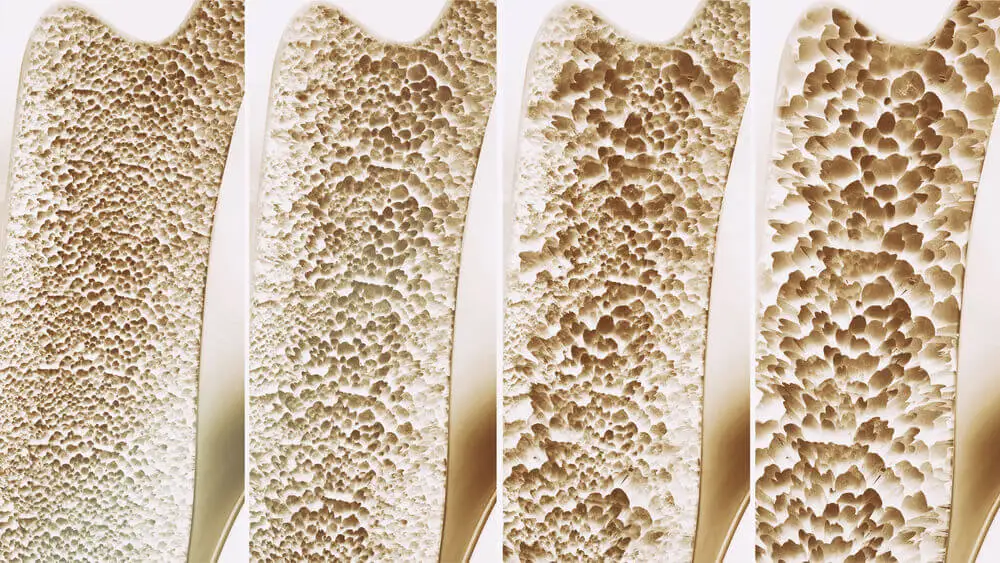Are Strontium Supplements Useful for Osteoporosis?

Osteoporosis is a bone disease that affects around 200 million people worldwide and is responsible for millions of cases of hip fractures per year according to reports. Nowadays there are several options available for the treatment of this condition and its complications. Are you interested in knowing if strontium supplements are useful to combat osteoporosis? We’ll tell you about it here.
A loss of bone mass and deterioration of the internal bone structure are the hallmarks of the disease. Strontium is a natural trace element capable of being stored up to 99% in the bones. Over the years, this mineral has been used to treat osteoporosis, sensitive teeth, bone pain, and even prostate cancer.
Today, there are different formats of strontium when it’s used as a medicine. Chloride and ranelate are the forms most commonly used as therapeutic options. This substance provides several benefits to bone health, but it could also compromise the health status of some people.
What is strontium?
Strontium is a soft metal found in nature in the form of sulfate and carbonate. This element has similar characteristics to calcium and magnesium, so it’s able to bind to the tissues of the human body. In this sense, it usually occupies the position of calcium in bones, increasing bone development and growth.
This trace element can be found in the sea and on land, as well as in some foods. In general, seafood is the main animal source. In addition, it’s in small amounts in the following foods:
- Grains
- Whole milk
- Spinach
- Beans
- Lettuce
- Celery
- Potatoes
- Carrots

Are strontium supplements useful against osteoporosis?
Currently, the forms of strontium marketed are ranelate, citrate and chloride. Strontium ranelate is credited with several benefits as an anti-osteoporosis drug in Europe. However, it hasn’t been approved by the U.S. Food and Drug Administration (FDA).
Strontium chloride and strontium citrate supplements don’t have the same effects as ranelate on osteoporosis. Similarly, there aren’t any studies that support the safety and efficacy of these supplements in the management of the disease.
Before consuming any substance for medicinal purposes, a health care expert should be consulted.
You may be interested in: Six Diet Tips to Prevent Osteoporosis
Benefits of strontium ranelate in osteoporosis
Strontium ranelate is a recently studied drug used in the treatment of osteoporosis. This substance has a dual mechanism of action, it’s able to inhibit bone destruction while stimulating the formation of new bone.
Research affirms that strontium ranelate increases collagen synthesis in bone and promotes the differentiation of osteoblastic precursors responsible for mineralization. In this sense, it shows great benefits in the prevention of fractures and in increasing bone density in people with osteoporosis.
The SOTI (spinal osteoporosis therapeutic intervention) study analyzed the effect of strontium in the prevention of vertebral fractures. It evaluated 1649 postmenopausal women with at least one vertebral fracture treated with 2 grams of strontium per day for 3 years. The final result was a reduction of up to 40% in the risk of new fractures, with an early reduction of 52% at one year.
On the other hand, the TROPOS (treatment of peripheral osteoporosis) study, conducted with 5091 postmenopausal women from Europe and Australia, showed that the use of 2 grams of strontium daily significantly improved bone density and reduced the risk of fractures by up to 36%.
Currently, some researchers recommend a dose of 500 milligrams to 1 gram daily to prevent osteoporosis and a high dose of 2 grams to treat osteoporosis that’s already present. However, other forms of supplementation, such as strontium chloride, have not shown similar efficacy in humans, so they remain under study.
Similarly, no maximum safe doses have been established today for children or pregnant and nursing women. In addition, it’s unclear whether use in combination with conventional treatments improves or worsens the course of the disease.

Read more: Does Drinking Dairy Products Prevent Osteoporosis?
Some side effects of strontium
In most cases, the use of strontium ranelate at recommended doses is usually relatively safe. However, continued and excessive consumption may cause the following effects:
- Nausea
- Vomiting
- Diarrhea
- Headache
- Fever
- Itching
On the other hand, recent European research states that people who consume strontium on a long-term basis have an increased risk of heart attacks, blood clots, and generalized hypersensitivity syndromes. In addition, it’s estimated that this drug may increase the risk of venous thrombosis.
A therapeutic solution still under investigation
Strontium ranelate is a recently discovered therapeutic option. Despite ongoing research, its use remains controversial for health professionals. On the other hand, supplements containing strontium citrate or strontium chloride don’t have the same effects against osteoporosis and shouldn’t be considered similar.
Calcium and vitamin D continue to be the best supplementation to maintain bone health. If you have any concerns, don’t hesitate to consult your doctor.
All cited sources were thoroughly reviewed by our team to ensure their quality, reliability, currency, and validity. The bibliography of this article was considered reliable and of academic or scientific accuracy.
- Lozano JA. Osteoporosis. Offarm. 2006: 25 (9): 62-68.
- Palacios C, Sánchez Borrego R, Valdés C, Baród F, et al. Recomendaciones sobre ranelato de estroncio en el tratamiento de la osteoporosis. Progresos de Obstetricia y Ginecología. 2012; 55 (1): 38-49.
- Reginster JY, Seeman E, De Vernejoul MC, Adami S, et al. Strontium ranelate reduces the risk of nonvertebral fractures in postmenopausal women with osteoporosis: Treatment of Peripheral Osteoporosis (TROPOS) study. J Clin Endocrinol Metab. 2005 May;90(5):2816-22.
- Reginster JY, Deroisy R, Jupsin I. Strontium ranelate: a new paradigm in the treatment of osteoporosis. DrugsToday (Barc). 2003;39:89-101.
- Meunier PJ, Roux C, Seeman E, et al. The effects of strontium ranelate on the risk of vertebral fracture in women with postmenopausal osteoporosis. N Engl J Med. 2004;350:459-68.
- Ferraro EF, Carr R, Zimmerman K. A comparison of the effects of strontium chloride and calcium chloride on alveolar bone. Calcif Tissue Int. 1983;35:258-60.
This text is provided for informational purposes only and does not replace consultation with a professional. If in doubt, consult your specialist.








